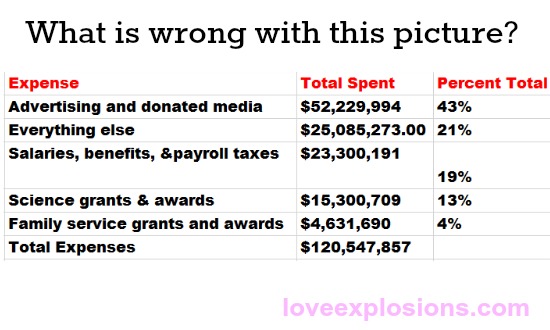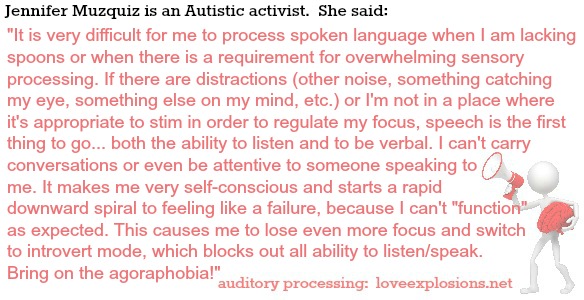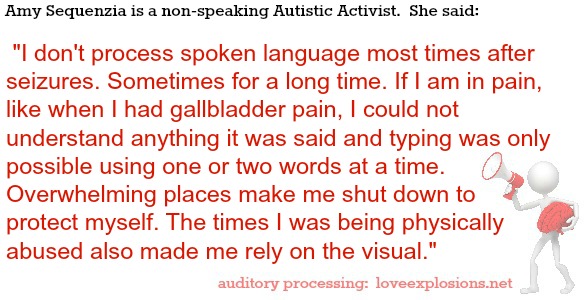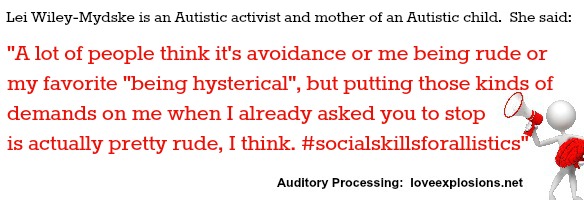
“Caregiver burnout” caries the implication that the person being cared for is somehow culpable. It also leaves others with the impression that this state of emotional distress is inevitable when you have an Autistic family member
I dislike the term “caregiver burnout.” To me, it carries a very negative and connotation about the person being cared for. It also seems to imply some sort of culpability on the person under care which makes me super uncomfortable in a way that I cannot articulate.
It makes me so sad to see people using this term to describe themselves and all that it implies about their Autistic children. And families. It makes me sad that these stories of hardship dominate the conversations about Autism because it gives the impression that there is no alternative to this way of life–to this emotional state of being when you’ve got an Autistic family member.
The media isn’t interested in shining a light on those families, families like mine, who have found a way to thrive and be happy. Content isn’t sexy. Happy isn’t sexy. Tragedy and misery are.
The voices of happy families get drowned out by the voices of those in the sexy depths of despair. As such, a real disservice is done to Autistic people and their families because they don’t get to see that happiness is very possibly well within reach.
Some people say that I’m not “real.” That I’m not “honest.” That I try to hide the realities of having an Autistic child. While I try to be loyal to my child’s expectation of privacy and certainly don’t share every challenge we face as a family, I am 100% truthful when I say that we are, in general, pretty darn happy. So I feel that I can share, with some confidence, some of the things that I believe help us maintain this state of well being.
Even if I am shouting into a void. Or into a crowd of people that aren’t ready/willing to open the door to a different way of doing things. I say to those parents on the edge, those crumbling and broken, “What do you have to lose by trying?”
Therapy/Intervention:
You don’t have to do everything that the experts recommend or make claims about “working.” I know that parents need to come to terms with a tremendous amount of shaming that comes with turning away from accepted Autism “treatment” protocols.
We stopped doing therapy outside of school hours a long time ago and have never regretted that decision. Evie gets daily speech and language services at school, she participates in physical education–both general ed, and adaptive.
Outside of school? She swims almost every day. She enjoys both the physical and recreational benefits of swimming.
As a family we enjoy the obvious benefits of not handing over any hope of disposable income to those experts that are standing with hands out to take it. We enjoy parenting a child that is not exhausted and overstimulated by 20+ hours of intensive intervention a week. We enjoy having an activity that we can all do together regardless of our individual abilities.
Find some physical activity that your child enjoys. Don’t prioritize interventions and therapies over it.
Speak to Autistic adults. Read what they write. Listen to what they say.
Down time:
Don’t underestimate the importance of down time. For every family member. Maybe especially your Autistic family member given the fact that becoming overstimulated doesn’t usually lead to good things for Autistic people.
Down time is self directed. Meaning there aren’t any expectations of what happens during down time (other than safety). What constitutes down time for you, does not necessarily constitute down time for your child.
Let your child choose (within reason) how he/she will spend his down time. Schedule down time every day.
Variety is the spice of life:
Not for everyone. It is possible to be perfectly happy going for long stretches of time (forever?) eating the same things. Doing the same things. This isn’t to say that opportunities to try new things shouldn’t be offered and gently encouraged. But take the pressure off your child (off yourself) to live a varied existence.
My child enjoys: pears, blueberries, corn, cheese, yogurt, apple sauce, apples, nut butters, pasta, and peas consistently. When I combine cheese and pasta or cheese and pretty much anything, I am able to include less desirable foods–like spinach, chicken, ground beef, etc. I’ve also found that she enjoys kelp noodles and quinoa pasta as much as the less healthy conventional alternative.
As long as your child’s nutritional needs are being met, don’t worry about variety. Don’t worry about spoiling your child by preparing special meals for him/her. Save yourself time and energy by cooking in bulk so that you have preferred foods ready to go.
Don’t be an “Autism Parent”:
Be a parent. Parent your child. Don’t parent a perceived set of deficits. Each child has an individual set of needs. The fact that other children don’t have the same needs does not mean that your child doesn’t have them.
I treat most of my child’s aversions like allergies. I wouldn’t try to make a person with nut allergies less or not allergic to nuts by forcing nuts upon him. No, it is not easy living in a world full of nuts with a nut allergy. But forcing nuts on a person who is allergic to them can have devastating consequences.
My child doesn’t like having her head touched. I don’t touch her head unless I have to for her health and safety. I don’t expose her to sounds that she cannot tolerate. I certainly don’t seek them out in the name of therapy.
Trust your child to say what is and isn’t okay for his/her body.
Make communication accessible:
Don’t value any one form of communication over another. For a long time, I was so focused on Evelyn speaking that I didn’t give her access to other forms of communication. In fact, I think I can even say I withheld it. This is probably the worst mistake I have ever made as a parent.
Give your child every tool possible to communicate. Remember that the ability to speak may not be constant.
Hearing the words, “I love you,” in any form is not nearly as important as hearing, “xyz hurts” or “I need xyz.”
Sleep matters:
Don’t underestimate the importance of sleep for anyone. Sleep in our house is hard won for both Evie and me. We’ve experimented with all sorts of strategies to achieve it. I resisted medication for Evelyn for a long time. But when she doesn’t sleep, she is even more prone to seizures and other forms of injuries. After trying just about every alternative to medication under the sun, both of use medication as a sleep aid.
I’m not pushing medication–especially for children. I’m pushing the benefits of sleep for everyone. Achieving sleep might mean stepping outside of your comfort zone.
I tried and tried to force a typical sleeping schedule on Evelyn. What I’ve discovered is that, she sleeps best early in the night. If she falls asleep between 6:30 and 7:30 PM, she will get up in the morning between 4:00 and 6:00. Later bedtimes don’t cause her to rise later and she functions best on 10-12 hours of sleep. As a night owl, I am still adjusting my sleeping rhythms to hers because my lack of sleep doesn’t seem to influence her sleeping. But when she doesn’t sleep, I don’t either.
Seek medical advice about sleeping. One of the things that likely kept Evelyn “up” during the first several years of her life is that she was an undiagnosed Epileptic. Don’t just assume your kid is a “bad sleeper.”
YOU need sleep too. Move heaven and earth to get it.
Ways we fight sleeplessness in our family: experiment with bed linens, experiment with sleep time lighting, experiment with white noise, experiment with sleeping location, experiment with sleeping times, ban on electronics in bedrooms, medication, etc.
Have a strictly flexible routine:
That makes no sense. But I don’t know what other way to describe it. Routines are king in our house. We have routines for everything–even going off routine like when we travel.
Our needs to know what is coming. Or she gets anxious.
When something comes out of nowhere and catches us off guard? Our routine is to indulge and sympathize. In our case, we don’t restrict screen time and loosen up our nutrition standards–see: Evie consumes an entire big bag of smartfood in one day while watching an endless stream of Sesame Street.
Have a routine. But when you go off routine, expect your child to need additional supports and accommodations.
Find a small and private support network:
Most people need to vent from time to time. Choose to do so in a way that does not violate your child and/or his privacy.
Have a question about parenting? Ask it. If it is about private matters, ask it privately or anonymously.
You don’t need to do it alone. But be respectful of your child and skip making your child’s life a public exhibit.
Go offline:
Seriously. When you’re feeling like you can’t hack it. Like you can’t give your children the care they deserve. GET.OFF.THE.WEB. Actually well before that. Shutting out the noise of the entire web should be one of your first steps.
Don’t over estimate your importance to the whole wide internet. Outside of your small and private support network, we will be just fine without you. I know you think people can’t live without your “real”, “raw”, and “honest” blog/facebook posts but I promise you, that parents of Autistic kids will be fine without your violin in the orchestra.
All snark aside, I spent the entire month of September completely offline (with the exception of occasionally crushing candy quietly in a dark corner of the internet). Actually, I pretty much spent the entire summer offline. I cannot overstate the importance of these breaks to me and my family–I highly recommend them.
Ignore Facebook, your blog, other people’s blogs, Twitter, Pinterest, and whatever grinds you down.
Love the child you have:
“I love my child BUT AUTISM IS HARD.” No. The “but” and everything that comes after it negates the “I love my child.”
Don’t think your child doesn’t pick up on that “but.”
Your kid is awesome. And if you’re still using the “but” after I love my child? You’re missing out on a world of wonderful and happy. Don’t waste another moment on the “but.”
Connect in ways that are meaningful to your child. Even if it doesn’t come naturally at first to you. Teach your child that he/she can trust you by being trustworthy and loyal–even when you think he/she isn’t looking.
Change the way you think. I love my child but Autism is hard. I love my child; therefore, I am going to parent according to my child’s needs.
Change the world. Not your child.
Like me, I know many parents of Autistic kids are worried sick over what will become of their children when they can no longer be the primary support system.
The truth is that Autistic people will never be safe in a world that demands that they change. In a world that doesn’t afford them the same standards of decency and humanity as those that aren’t disabled.
As parents, know that with every public statement you make about your child, you are telling the world what to believe about Autistic people. You are telling the world how to treat your child and every other Autistic person now and in the future.
Spend your energy fighting against Autistic bigotry, not against the nature of your child.
Behavior Management:
Every time I think about how most Autistic kids are treated? I feel a little panicky.
Imagine spending your days being prompted at every moment. That there is a constant demand that you keep still. That you suppress your need to move in the slightest. That assumptions are made about the function of everything you do or say. That you have almost zero moments in your day to zone out. That someone is almost always in your face telling you what you must do.
Say nothing of being overstimulated by other sensory input almost always. That people believe you to be simultaneously incapable and not working to your potential out of stubborn refusal. That people do not respect your autonomy and that they think nothing of constantly hand over handing your every movement.
Your communication is shut down, not honored, ignored, written off as undesirable behavior, withheld, or otherwise not available. What are you left with?
I’d protect myself physically too. I know it.
Try backing off. You won’t believe the difference this can make. Ask me about how the school labeled Evie “a different child” when the ABA stopped entirely. In other words, they started to see the only happy child her family ever knew.
What do you do to maintain familial happiness?
 So Autism Speaks finally released its audited financial statements. I wish I could say that I am surprised by their brazen irresponsibility.
So Autism Speaks finally released its audited financial statements. I wish I could say that I am surprised by their brazen irresponsibility.



























